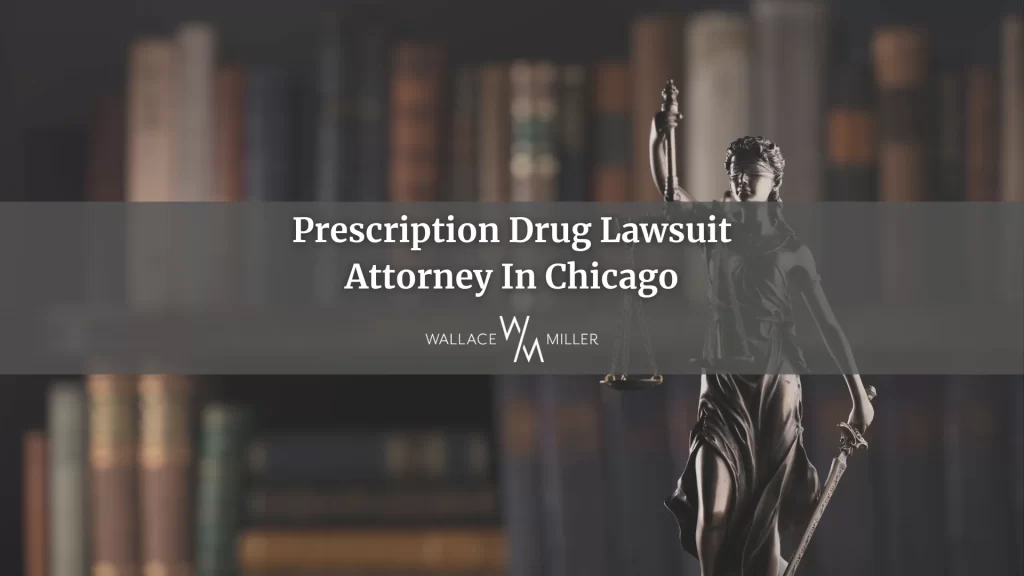
If you sustained an injury or developed a medical condition from a defective prescription drug, contact the product defect and mass tort attorneys of Wallace Miller immediately. You might qualify to join a mass tort lawsuit against the manufacturer. We could represent you in your case and pursue the compensation you’re entitled to for your injury.
Prescription drugs can contain defects that cause a range of complications for consumers. The defects make them inherently unsafe for use. Whether the manufacturer mishandled the drug causing contamination during manufacture or didn’t include the required warning labels, anyone could experience adverse effects from the defective medication.
Manufacturers must provide prescription drugs that meet various quality and safety standards. All packaging should include instructions regarding the dosage and other valuable information along with warning labels to inform the user of the risks they could face when they take the drug. Injuries and illnesses can result from a defective drug despite the user taking it as intended.
At Wallace Miller, our prescription drug lawsuit attorneys understand the trauma you experienced. You trusted the medication you took to manage your symptoms or cure your disease. Instead, it caused medical issues that required additional treatment. The cost of your medical bills can be a significant financial burden and lead to crushing debt. You should not be responsible for the expenses you incur when someone else is at fault for what happened to you.
Wallace Miller is ready to help you hold the manufacturer liable for their misconduct. Call us at (312) 261-6193 for your free consultation and learn more about what we can do for you.
Common Types of Defective Prescription Drugs
At Wallace Miller, we represent clients throughout the country in product liability cases involving a range of different types of defective prescription drugs, including:
Tenofovir disoproxil fumarate (TDF)
TDF is the active ingredient in a group of drugs used to treat and prevent HIV and hepatitis B. The highly toxic ingredient can cause medical conditions, such as kidney disease, bone damage, and lactic acidosis.
Studies show an increased risk of pigmentary maculopathy and other vision-related problems from Elmiron. Sleep disorders, hair loss, and headaches are additional adverse effects reported by patients using the popular drug to treat interstitial cystitis (IC).
Ranitidine, the generic version of Zantac, and Zantac contain N-Nitrosodimethylamine (NDMA), and have been revealed to be probable human carcinogens. These drugs can cause cancer and other serious medical conditions.
Taxotere
Taxotere is a chemotherapy drug that attacks and shrinks cancer cells to prevent them from spreading to other parts of the body. Secretions released by the drug interact with a person’s tears and can cause inflammation and infections, eventually leading to Canalicular Stenosis, an incurable eye condition.
A proton pump inhibitor treats gastroesophageal reflux disease (GERD), ulcers, and similar medical conditions. The prolonged use of Nexium, Prilosec, and other proton pump inhibitors increases the risk of esophageal cancer, kidney disease, heart disease, and a range of other adverse health problems.
Zofran
Doctors commonly prescribe Zofran to pregnant women to alleviate nausea and vomiting. However, the manufacturer never received FDA approval for this particular use. Birth defects, such as musculoskeletal deformities and cleft palate, can result from taking this drug while pregnant.
Actos
Actos effectively treats type 2 diabetes by regulating the patient’s blood sugar levels. Studies found a link between the drug and bladder cancer. However, the manufacturer did not disclose the risk on warning labels.
If you experienced unusual symptoms or complications from any prescription drug, contact Wallace Miller right now. One of our prescription drug lawsuit attorneys can review your case and determine whether we can represent you against the manufacturer.
Understanding the Elements of Mass Tort Litigation
A mass tort case involves a group of people who suffered an injury or illness due to the negligent actions of one defendant. Pursuing a mass tort lawsuit requires combining individual cases into one legal action to bring before a judge.
Every plaintiff involved in the lawsuit must have a claim similar to the others. The injuries don’t necessarily have to be the same, but the allegations must be the same. For example, in a prescription drug case, each plaintiff must suffer adverse effects from the same medication.
Everyone in the lawsuit does not share the financial award equally. Instead, the court will determine the amount of compensation each plaintiff is entitled to based on the unique circumstances of their case. Someone with cancer will likely receive more money than someone who suffered minor side effects.
Possible Liable Parties in Mass Tort Cases
When joining a mass tort lawsuit, you can pursue legal action against any party responsible for the defective drug. The most common parties plaintiffs hold liable include:
- Manufacturer
- Retailer
- Distributor or Seller
- Design Team
- Supplier
- Warehouse Employee
- Marketing Company
Anyone who contributed to the defect in the prescription drug could be at fault for your injury. Mass tort cases often name the manufacturer as the defendant. However, you could pursue legal action against other parties responsible for the dangerous medication.
Compensation for Defective Prescription Drugs
You could recover compensation from a mass tort lawsuit to cover various losses from the injury you sustained while taking the dangerous drug. The money you receive might compensate for your losses, such as:
- Medical Bills
- Out-of-Pocket Expenses
- Lost Wages
- Lost Earning Capacity
- Pain and Suffering
- Mental Anguish
- Loss of Enjoyment of Life
You might also be able to recover punitive or exemplary damages. This form of compensation punishes the defendant for their actions and deters similar behavior in the future. You must show clear and convincing evidence of the defendant’s misconduct to receive this financial award.
Statute of Limitations for Mass Tort Lawsuits
There isn’t a general timeframe for filing a mass tort lawsuit. You must follow the statute of limitations in your state if you want to participate in a mass tort case.
The statute of limitations period begins on the date you sustain an injury or discover that the defective drug caused harm. Most states impose statutes of limitations periods of between one and five years. You must file your lawsuit within this window of time or lose your right to pursue compensation in court.
Additionally, some state laws allow plaintiffs to toll the statute of limitations under specific circumstances. For example, if you were a minor at the time of the injury, the timeframe will not begin until you turn 18, 19, or 21, depending on the state where you file.
We don’t want to burden you with more expenses. That’s why we take cases on contingency. That means there are no upfront fees or costs. You don’t have to pay our legal fees unless we recover compensation for you. If we lose your case, you will never owe us any money.
Wallace Miller will provide the one-on-one attention and support you need to get through this devastating time in your life. You will receive ongoing communication from start to finish of the process, so you always know the status of your case. We treat every client as a priority and strive to provide quality legal services and representation no matter what.
If you suffered a medical condition or injury from a defective prescription drug, call Wallace Miller at (312) 261-6193 today for your free consultation. One of our prescription drug lawsuit attorneys can meet with you and advise you about joining a mass tort case against the manufacturer.

Contact Us
At Wallace Miller, we understand the financial strain you face after taking a defective prescription drug. You likely require treatment to manage your symptoms and recover from the medical condition you developed. Many people can’t afford the additional cost of seeking legal representation.

